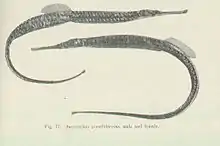Vanacampus poecilolaemus
Vanacampus poecilolaemus, also known as the Australian long-nosed pipefish is a species of marine fish belonging to the family Syngnathidae.[1] They can be found inhabiting seaweed and seagrass beds of estuaries along the southern coast of Australia including the northern coast of Tasmania.[2][3][4] Their diet likely consists of small crustaceans such as mysid shrimps.[5] Adults of this species can reach up to 30 cm in length.[2] Reproduction occurs through ovoviviparity in which the males brood eggs before giving live birth to roughly 40-50 offspring.[2][6]
| Australian long-nosed pipefish | |
|---|---|
 | |
| Syngnathus poecilolaemus | |
| Scientific classification | |
| Kingdom: | Animalia |
| Phylum: | Chordata |
| Class: | Actinopterygii |
| Order: | Syngnathiformes |
| Family: | Syngnathidae |
| Genus: | Vanacampus |
| Species: | V. poecilolaemus |
| Binomial name | |
| Vanacampus poecilolaemus Peters 1868 [1] | |
References
- Pollom, R.; Rachinski, T. "Vanacampus poecilolaemus". The IUCN Red List of Threatened Species. Retrieved 22 May 2019.
- Dawson, C.E. (1985). Indo-Pacific Pipefishes (Red Sea to the Americas). Ocean Springs, Mississippi, USA: The Gulf Coast Research Laboratory.
- Kuiter, R.H. (1993). Coastal fishes of south-eastern Australia. Honolulu, Hawaii: University of Hawaii Press.
- Gomon, M.F.; Bray, D.J.; Kuiter, R.H. (2008). Fishes of Australia’s Southern Coast. Chatswood, NSW, Australia: Reed New Holland, Museum Victoria.
- Kendrick, A.J.; Hyndes, G.A. (2005). "Variations in the dietary compositions of morphologically diverse syngnathid fishes". Environmental Biology. 72: 415–427.
- Bray, D.J.; Thompson, V.J. "Vanacampus poecilolaemus". fishesofaustralia.net.au. Museum of Australia.
This article is issued from Wikipedia. The text is licensed under Creative Commons - Attribution - Sharealike. Additional terms may apply for the media files.
